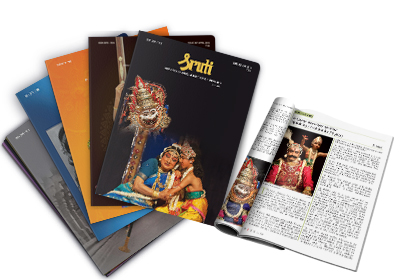
‘Amma’, the Tamil word for mother, can mean many things depending upon the context in which it is used. Spiritually, it means ‘Taayaar’, the mother goddess. To twenty-seven year old vocalist Sumithra Vasudev however, it invariably means her guru, vidushi Sangita Kalanidhi R. Vedavalli. Almost in every other sentence Sumithra speaks, there is areference to ‘Amma’.
In more ways than one, Sumithra has identified herself totally with her guru, at whose home she spends much ofher spare time. Vedavalli’s late mother used to dote on her. Vedavalli’s husband, Santhanam still does. Musically,Sumithra is a clone of Vedavalli, providing vocal support in all her concerts. Although their natural sruti-s are quite different, Sumithra is able to accompany her guru without much effort.
Exuberance is not part of Sumithra’s personality. There are neither flourishes nor exhibitionism in her music. She becomes so immersed in it that she seems to forgetthe audience in front of her! She makes no eye contact with the audience, although nowadays, she seems to recognise that there are accompanists sitting by her side and bestows a rare smile on them!
For all that, her music is compelling and soothing at the same time. Never one to flaunt her wares, what she presents is however, solid, whether in melody or meter. She finds enough scope for manodharma in the pathantara of her guru without having to venture outside its boundaries. And, true to character, her only guru for more than twenty years has been Vedavalli, while most youngsters switch guru-s nearly as often as they change their attire! Sumithra’s steadfastness may be because of her realisation that her guru’s vast repertoire requires a lifetime to imbibe.
Early inspiration was provided by Sumithra’s paternal grandmother Janakam Chari—a well known figure in Calcutta’s music and social circles and a disciple of Ananthakrishna Iyer (a highly respected guru belonging to the Dikshitar tradition)—and her grandfather, the late P.R. Chari, a connoisseur of music who settled down in Chennai.Sumithra’s mother Padmaja, with a bachelor’s degree in Sanskrit, is also well versed in music. She provided the early impetus for her musical career. By the time Sumithra turned seven, she had already started training withVedavalli. It was a semi-gurukulam kind of arrangement, as she spent a major part of her off-school hours in her guru’s house. Indeed, during the summer vacation of 1990, her parents decided that she should spend all her waking hours in Vedavalli’s house as in the gurukulam format of yore, but she was so badly spoilt by her guru’s immediate family that they dared not repeat the experiment thereafter!
As soon as Vedavalli felt that her disciple had attained enough maturity not to be influenced by the superficial aspects of music, but would, on the other hand, be able to absorb deeper values, she actively encouraged her to listen to the programmes of other musicians. Thus, Sumithra has attended workshops conducted by Nedunuri Krishnamurthy on Bhadrachala Ramadas and Annamacharya, and S. Rajaram on his grandfather Vasudevacharya’s kriti-s. She is now the recipient of a fellowship from the Sangeet Natak Akademi to learn with greater focus on ragam-tanam-pallavi with vidwan B. Krishnamurthy.
Sumithra has performed solo and with her guru all over India and also in the Middle East. Two concerts of hers, one at the Music Academy and another at the Narada Gana Sabha have enjoyed commercial releases as CDs. She has cut CDs on Devi kriti-s and songs on Krishna. A CD on Narayana Teertha’s compositions and another highlightingthe raga-s Sree, Ranjani and Sreeranjani are in the music market. A double CD album on the stotra-s written by Dr. V. Raghavan, the Sanskrit scholar, has also been released. There are many more and in some of them, she has also composed the music. At present, she is a ‘B-high’ graded artist of AIR.
Another side to Sumithra’s personality is her love of languages. She is passionate about Sanskrit (“I am at a loss to say whether I love music or Sanskrit more”, she confides!). After a B.A. in Sanskrit from Queen Mary’s College, Chennai,she did her Masters at Sri Venkateswara University, Tirupati. Her dream is to enrol for a doctorate. She secured an All-India first rank in the Sanskrit examination ‘Samartha’ conducted by the Samskrita Bhasha Pracharini Sabha,Chittoor. A regular participant in the activities of the Dr. Raghavan Centre for Performing Arts and Samskrita Ranga, she sings for their Sanskrit dramas and has set to music, poems of Mahakavi Kalidasa and presented them before
Sanskrit gatherings. She has also presented research papers in seminars on music in ancient Sanskrit texts. She prefers Kalidasa and Bana over English novels as her reading material.
She has also specialised in presenting the Nalayira Divya Prabandham, and presented exclusive concerts in these. She has sung Tevaram songs in concerts in their structured format. For someone with more than 500 compositions of various composers in her bag, she knows a fair number of Tamil songs too, including many less known composers like Papavinasa Mudaliar (whose only well known kriti vidwans sing is Nadamadi tirinda in Kambhoji). As a logical extension to music, she has also learnt the art of Harikatha from Kalyanapuram Aravamudachariar.
Sumithra has won many prizes and awards from sabha-s and institutions for her music. Some of the titles she has received include Nada Oli, Yuva Kala Jyoti, and Yuva Kala Bharati.She has been selected to receive the central Sangeet Natak Akademi’s “Ustad Bismillah Khan Yuva Puraskar Award” for the year 2008. She has been performing in the Music Academy in the sub-senior slot. Performing in the ‘November Fest, 2008’ organised by The Hindu is also a creditable achievement.
Happily married to Vijay Madhavan, a Bhagavata Mela artist and a Bharatanatyam dancer trained by Chitra Visweswaran, Sumithra is the mother of two young boys. It is quite a mystery how this young achiever successfully manages so many activities with élan.


